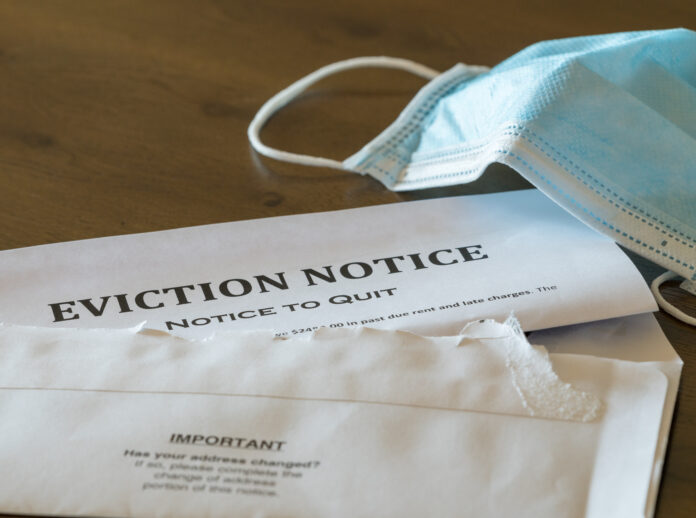The Centers for Disease Control and Prevention’s previous moratorium on evictions expired July 31. However, on Aug. 3, the federal health agency issued a renewed moratorium, this time targeting counties with heightened levels of community transmission of COVID-19.
The new eviction moratorium applies in counties experiencing, per the CDC’s definition, “substantial” or “high” COVID-19 community transmission. Volusia County definitely qualifies.
Click HERE to read the full CDC eviction moratorium issued Aug. 3.
Community transmission is defined by two metrics, including the number of positive cases per 100,000 residents. A county is experiencing “substantial” community transmission when new COVID-19 cases in the past seven days number between 50 and 99.99 per 100,000 residents. A county is experiencing “high” community transmission when new cases number 100 or more per 100,000 residents.
Every Florida county will be included in the new moratorium on evictions. As of Aug. 1, more than 80 percent of all U.S. counties were experiencing substantial or high community transmission, per the CDC.
Sixty-six of Florida’s 67 counties, including Volusia County, were experiencing high community transmission Aug. 1, with Glades County the only county experiencing only “substantial” community transmission.
From Jan. 1, 2021, to July 2021, more than 50 households in Volusia County had filed CDC documents to prevent eviction. In some cases, the CDC order was the only way some individuals kept their housing.
Per the CDC, “Researchers estimated that this temporary federal moratorium provided relief to over one-quarter a material portion of the nation’s roughly 43 million renters.”
People who filed CDC documents under the previous eviction moratorium — and live in an area of high or substantial transmission — will not need to file documentation again.
The eviction moratorium will no longer apply when a county experiences community transmission under the substantial level for 14 consecutive days.
While happy to see the new moratorium, Community Legal Services of Mid-Florida’s Director of Public Interest and Litigation Jeffrey Hussey said it may not last.
“It’s going to be challenged, and we have no way to predict if it will survive challenges in the court,” he told The Beacon. “It may just be a temporary postponement, so we’re telling people you need to have a plan. Don’t think you have housing stability based on this moratorium until October, because there’s no guarantee this will be in place for the next two months.”
DeLand attorney Heather Caeners, who frequently represents landlords, was not happy to see a new moratorium on the books.
“That is an invalid, unconstitutional order,” she told The Beacon. “We have people that we have voted for and put in office to legislate and create rules and regulations, not the CDC.”
President Joe Biden recognized the question of constitutionality at an Aug. 3 press conference.
“The bulk of the constitutional scholarship says that it’s not likely to pass constitutional muster,” Biden said. “But there are several key scholars who think that it may, and it’s worth the effort.”
Caeners said if a local landlord were to come to her with an eviction case, despite the current moratorium, she would take it on.
“The first case I get someone trying to claim this as a stay, I’m going to claim a constitutional argument,” she said. “I truly believe what is going on here is a usurpation of power by a non-elected governmental agency.”
As for landlords trying to get along without rent payments, governmental assistance programs can help.
Caeners urged renters struggling to pay to look into these programs to ensure some money gets into their landlords’ pockets.
“There are funds available, allegedly,” she said, “but the tenants have to take the steps to do it.”
Hussey stressed the same. Anyone who is uncertain about their housing or their ability to pay rent beyond the eviction moratorium, he said, should apply for rental assistance.
What can you do?
Options available to individuals worried about losing their housing:
Volusia County emergency rental assistance — Volusia County’s emergency rental assistance program can provide households with up to six months of assistance for rent and utility payments.
All renters earning an income that’s at or below 80 percent of the area median income are eligible to apply. (The median income is $64,875 for a family of four.)
Applications for the next round of assistance opened July 20. Visit www.Volusia.org/era.
OUR Florida — OUR Florida is a program operated by the Florida Department of Children and Families offering emergency rental assistance. All renters earning an income at or below 80 percent of the area median income are eligible to apply for assistance. For more information, visit OUR Florida’s website at https://www.ourflorida.com/.
The Neighborhood Center of West Volusia — The Neighborhood Center of West Volusia, based in DeLand, has a number of resources available for individuals and families worried about their housing, from rapid rehousing assistance to rental assistance. For more information, visit their website, www.neighborhoodcenterwv.org, or call their offices at 386-734-8120.
Community Legal Services of Mid-Florida — Community Legal Services of Mid-Florida is a legal-aid organization that provides free legal assistance to low-income individuals.
Director of Public Interest and Litigation Jeffrey Hussey urged people fearing for their housing situations to call 800-405-1417 or go online to www.clsmf.org. As Hussey said, “We’re free, free, free.”
